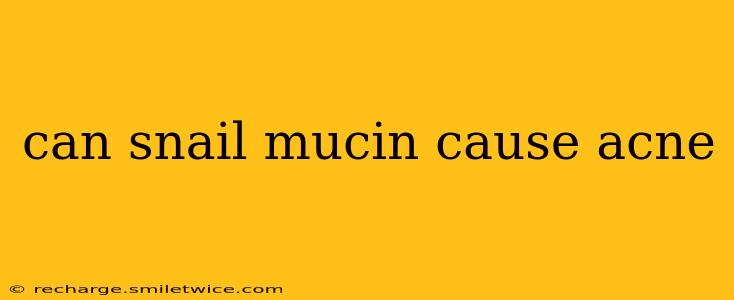Snail mucin, a secretion from snails, has exploded in popularity as a skincare ingredient, touted for its purported ability to improve skin texture, reduce wrinkles, and even fade acne scars. However, a common question arises: can snail mucin cause acne? The answer isn't a simple yes or no, and understanding the complexities requires delving into its properties and potential effects on different skin types.
What is Snail Mucin and What Are Its Claimed Benefits?
Snail mucin is a viscous fluid secreted by snails. It's rich in beneficial components like hyaluronic acid, glycolic acid, allantoin, copper peptides, and antimicrobial peptides. These components are believed to contribute to its purported benefits, including:
- Hydration: Hyaluronic acid is a potent humectant, drawing moisture to the skin and keeping it hydrated.
- Wound Healing: Allantoin promotes cell regeneration and soothes irritated skin.
- Anti-aging: Copper peptides stimulate collagen production, potentially reducing wrinkles and improving skin elasticity.
- Acne Treatment (Claimed): Antimicrobial peptides may help fight acne-causing bacteria.
Can Snail Mucin Cause Acne Breakouts?
While snail mucin is often praised for its acne-fighting potential, it can, in fact, trigger breakouts in some individuals. This is primarily due to its:
- Comedogenicity: Some individuals may find snail mucin to be comedogenic, meaning it can clog pores and lead to blackheads, whiteheads, or pimples. This isn't inherent to snail mucin itself, but rather a reaction unique to certain skin types. Those with oily or acne-prone skin are more susceptible.
- Ingredient Sensitivity: Like any skincare ingredient, some people may be allergic or sensitive to components within snail mucin. This allergic reaction could manifest as acne-like breakouts, redness, itching, or swelling.
- Product Formulation: The quality of the product matters significantly. Impure or improperly formulated snail mucin products can introduce other irritants or contaminants that may exacerbate acne. Always choose reputable brands with transparent ingredient lists.
Does Snail Mucin Help with Acne Scars?
While snail mucin might not directly treat active acne, its wound-healing properties may help reduce the appearance of acne scars. The allantoin and copper peptides contribute to collagen synthesis, potentially promoting skin regeneration and minimizing the visibility of scars. However, it's crucial to note that this isn't a guaranteed outcome and results vary among individuals.
How Can I Tell If Snail Mucin is Right for My Skin?
Before incorporating snail mucin into your skincare routine, consider these factors:
- Patch Test: Perform a patch test on a small area of skin before applying it to your entire face. This helps determine if you have any allergic reactions or sensitivities.
- Skin Type: If you have oily or acne-prone skin, proceed with caution. Start with a small amount and monitor your skin's reaction closely.
- Product Quality: Opt for products from reputable brands with clear ingredient lists and positive reviews.
Is it Safe to Use Snail Mucin During Pregnancy or Breastfeeding?
There isn't enough scientific research to definitively confirm the safety of snail mucin during pregnancy or breastfeeding. It's best to consult with your doctor or dermatologist before using it during these periods.
What are the Alternatives to Snail Mucin for Acne?
Many other skincare ingredients effectively treat acne, such as:
- Salicylic acid: Exfoliates and unclogs pores.
- Benzoyl peroxide: Kills acne-causing bacteria.
- Retinoids: Increase cell turnover and reduce inflammation.
In conclusion, while snail mucin offers potential benefits for some, it's not a guaranteed acne solution and can even trigger breakouts in others. A patch test, awareness of your skin type, and careful product selection are crucial to minimize risks and maximize potential benefits. Consult a dermatologist for personalized advice on acne treatment.
